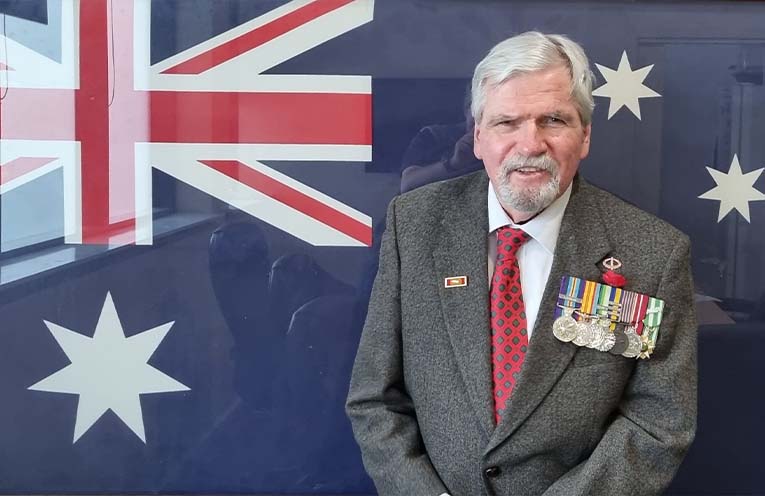
VETERANS and civilians alike will unite for Remembrance Day on Monday 11 November, to honour the sacrifices made in all conflicts.
In advance, infantry veteran Col David Mead (retd) shared some of his experiences during and following the Vietnam War.
 Advertise with News of The Area today.
Advertise with News of The Area today.It’s worth it for your business.
Message us.
Phone us – (02) 4981 8882.
Email us – media@newsofthearea.com.au
By the age of 22, he was a platoon commander in Vietnam, in the Fifth Battalion.
His men were all similarly aged and both regulars and conscripts.
This first tour ended tragically on the night of 4 July, 1969, when landmines killed three and wounded many others – including David.
“It is the only night of my 30 years’ service I would like to take back,” he told the News Of The Area.
Upon recovery, he entered the Jungle Training Centre as an instructor and soon decided to return to Vietnam, where he trained young officers and NCOs of the South Vietnamese Army.
After Vietnam, his career took him far afield.
It included a posting on exchange to the British Army in Germany and, later, to commanding and exercising the 6th Battalion from northern Australia to California.
By the 1990s, as the Director of Infantry based at Singleton, he volunteered to be Defence Attache Cambodia.
“I took language courses, but I am not a linguist. [I] had a great interpreter, Toch Rada, who had saved two lives in the UN Force when it was involved in supervising elections there.
“I thoroughly enjoyed my two-plus years as a defence attaché. We had good programs aimed at making the Cambodian Armed Forces a more professional organisation.
“The so-called coup of late ‘97 halted the programs and my tenure as DA, and with fatigue and accompanying PTSD I was evacuated to Australia.”
David resigned but was back in Cambodia after a few months as a civilian, working to save the forests and wildlife of the Cardamom Mountains, which remains protected.
Apart from management of the NGO he raised on behalf of Conservation International, he has also assisted in supporting a number of NGOs seeking UN and donor support, as well as helping raise the Blind Association and the Buddhism for the Environment NGO.
During his attache time in the mid-to-late 1990s, David became acutely aware of the forestry crimes in the country, perpetrated by people with lots of money in high places, even in protected areas.
This put him on a literal warpath to enforcing forest conservation, which led to him being the subject of a 2004 SBS production called “Conservation Colonel”.
The program follows his conservation enforcement efforts along the Thai border.
“They chop trees down to nothing, even the mother-trees, destroying the biodiversity of the area, because the local wildlife inevitably ends up being hunted and killed, too.”
Cambodia is one of the most forested countries in the world.
According to NASA Earth Observatory, it has one of the fastest rates of forest loss in the world, mainly due to clearing for timber and rubber plantations.
David long ago discovered poetry as an outlet, and a way to express his feelings about his experiences.
The Phnom Penh Post, where he once worked as a journalist, helped him to produce and publish his own book of photos and verse called “The Churning: Portrait of a people tormented”.
“I never learnt poetry, but I like to do it. And “‘The Churning” was my catharsis.
“It is named after a Hindu creation myth about the churning of the sea of milk.”
David’s works favour the concept of “concrete poetry”, as many of his texts are deliberately formatted to create a shape relevant to the poem itself.
Recently moving to the Tea Gardens-Hawks Nest area for family – and the prospect of good fishing and golf – he will continue to write poetry.
He will also be among the veterans at the Tea Gardens ANZAC Park on Monday 11 November for the Remembrance Day service.
By Thomas O’KEEFE
